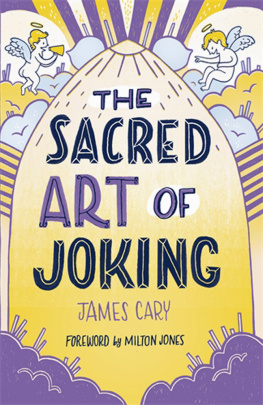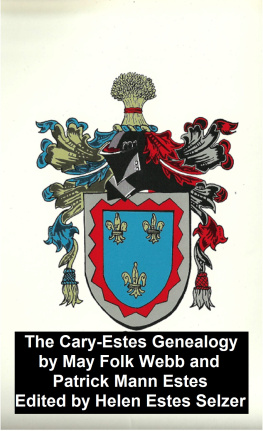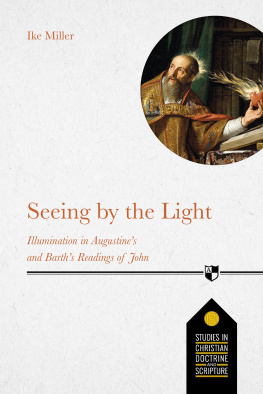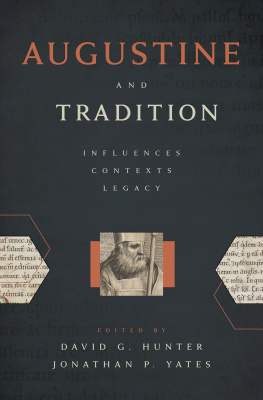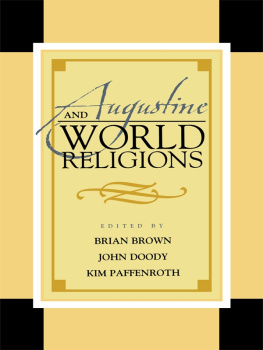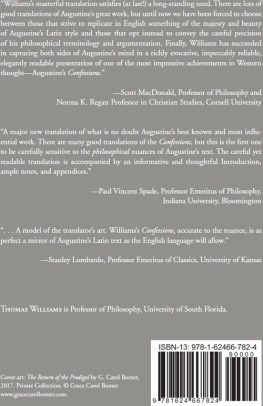Cary - Augustines invention of the inner self: the legacy of a Christian platonist
Here you can read online Cary - Augustines invention of the inner self: the legacy of a Christian platonist full text of the book (entire story) in english for free. Download pdf and epub, get meaning, cover and reviews about this ebook. City: Oxford, year: 2003;2000, publisher: Oxford University Press, Incorporated, genre: Religion. Description of the work, (preface) as well as reviews are available. Best literature library LitArk.com created for fans of good reading and offers a wide selection of genres:
Romance novel
Science fiction
Adventure
Detective
Science
History
Home and family
Prose
Art
Politics
Computer
Non-fiction
Religion
Business
Children
Humor
Choose a favorite category and find really read worthwhile books. Enjoy immersion in the world of imagination, feel the emotions of the characters or learn something new for yourself, make an fascinating discovery.

Augustines invention of the inner self: the legacy of a Christian platonist: summary, description and annotation
We offer to read an annotation, description, summary or preface (depends on what the author of the book "Augustines invention of the inner self: the legacy of a Christian platonist" wrote himself). If you haven't found the necessary information about the book — write in the comments, we will try to find it.
Cary: author's other books
Who wrote Augustines invention of the inner self: the legacy of a Christian platonist? Find out the surname, the name of the author of the book and a list of all author's works by series.
Augustines invention of the inner self: the legacy of a Christian platonist — read online for free the complete book (whole text) full work
Below is the text of the book, divided by pages. System saving the place of the last page read, allows you to conveniently read the book "Augustines invention of the inner self: the legacy of a Christian platonist" online for free, without having to search again every time where you left off. Put a bookmark, and you can go to the page where you finished reading at any time.
Font size:
Interval:
Bookmark:
Augustines Invention of the Inner Self
The Legacy of a Christian Platonist
Phillip Cary


Oxford New York
Athens Auckland Bangkok Bogot Buenos Aires Calcutta
Cape Town Chennai Dar es Salaam Delhi Florence Hong Kong Istanbul
Karachi Kuala Lumpur Madrid Melbourne Mexico City Mumbai
Nairobi Paris So Paulo Singapore Taipei Tokyo Toronto Warsaw
and associated companies in
Berlin Ibadan
Copyright 2000 by Phillip Cary
Published by Oxford University Press. Inc.
198 Madison Avenue, New York, New York 10016
Oxford is a registered trademark of Oxford University Press
All rights reserved. No part of this publication may be reproduced,
stored in a retrieval system, or transmitted in any form or by any means,
electronic, mechanical, photocopying, recording, or otherwise,
without the prior permission of Oxford University Press.
First issued as an Oxford University Press paperback, 2003
Library of Congress Cataloging-in-Publication Data
Cary, Phillip. 1958
Augustines invention of the inner self: the legacy of a
Christian platonist / Phillip Cary.
p. cm.
Includes bibliographical references and index.
ISBN 0-19-513206-8 0-19-515861-X (pbk.)
1. Augustine, Saint. Bishop of HippoContributions in doctrine
of soul. 2. SoulHistory of doctrinesEarly church, ca. 30-600.
I. Title.
BT741.2.C37 1999 99-21119
189.2dc21
1 3 5 7 9 8 6 4 2
Printed in the United States of America
on acid-free paper
For Nancy
Beloved Other, One Flesh
Of Traditions, Inventions, and Ancient Fathers
This is the story of the invention of something new, and like all such stories it is not as straightforward as one could wish: one arrives at new things only after exploring a great deal of other territory and poking into many blind alleys. I hope to have made the story easier to follow by providing summaries of each chapter, so that readers can always have a map of where they are in the whole exploration, and those who like to skip around in the more familiar parts of the story can do so. The problem is that even the chapters that fill in background information contain a great deal that will be unfamiliar to the nonspecialist, as well as controversial to the specialist, and hence for both reasons could not be omitted. My test of whether all that background material was really needed is my sense of how very bizarre the climactic narrative (in chapters 6 through 10) would be without it. You are welcome to try the test yourself.
Throughout, it has been my concern to make this book accessible to non-specialists (i.e., everyone who has not studied Augustines debts to Platonism) while also addressing the deep issues raised by the specialist scholarship. The two non-specialist audiences I have had most in mind are those interested in philosophy and general intellectual history on the one hand, and those interested in theology and the history of Christian thought on the other. I have often stopped to explain things to the one audience that I would take for granted as familiar to the other, and vice versa. And in both cases, even the most familiar themes, I have often found, had to be handled in unfamiliar ways in order to make sense of the astounding phenomenon of Augustine.
It will help you follow the twists and turns of this story if I tell you that I think of intellectual history or the history of ideas primarily in terms of intellectual traditions and their problems. Such problems, in addition to encounters with other traditions, are prime movers of inquiry in a tradition, and thus a prime source of new ideas in human history.
An inquiry is a kind of adventure or exploration, a search to find a solution to a problem. This finding is the root sense of the word invention in the books title: originally, the Latin word inventio meant finding the right word or thought for an occasion, hence also finding the solution to a problem. Ancient inventio eventually became modern inventionthe making up of something new rather than the finding of something already therebecause an invention in the modern sense is typically the finding of a solution to some problem of design, thought, or practice. My story represents the concept of inner self as an invention, in the sense that it is the finding of a solution to a philosophical and theological problem. But of course that leaves open the question of whether inwardness, and in particular the private inner self, is inventio in the ancient sense or invention in the modern sensean old thing found or a new thing produced.
Though I would like to leave the question open as far as I can for you to form your own judgment, it is only fair to let you know at the outset that in my own view the private inner self is in fact something Augustine made up rather than discovered. In this respect you can call him original or creative. I myself shall avoid such terms, however, for they fit the subject badly. Like all ancient thinkers, Augustine would have regarded originality as innovation and novelty, which are bad thingsopposed to the antiquity of truth. So invention, with its peculiar ambiguity, is the most neutral term I could find for what Augustine is up to. Besides, the term itself plays a key role in Augustines concept of the inner self, as shall be seen in the last chapter.
The inner self is the sort of issue on which it is hard not to take sides, so let me try to explain (especially to those on the opposite side) why I think mine is the sort of story that is best told by someone who is not fully in sympathy with his protagonists. I shall portray Augustine (and Plato and Aristotle and Plotinus) as writers offering us solutions to problems that may or may not be our own, depending on whether or not we accept the premises of the problem. If you already believe certain doctrines are true, then finding a good solution to the problems raised by those doctrines gives you reason to believe the solution is true as well. But if you dont think the doctrines are true in the first place, then you can regard the solutions as inventions (in the modern sense of the word). In my experience, not believing the doctrines that produce philosophical problems makes it easier to discern what is actually going on in the solution. Otherwise ones hopes or fears that the solution be true tend to get in the way of understanding it on its own terms, as one either tries to assimilate it to ones prior convictions or else rejects it as a mistake because one cant assimilate it. Since the problems I study here all arise within the Platonist tradition, and I am no Platonist, I do not think the solutions to these problems are true. Yet by the same token they are not mere arbitrary mistakes either. They are inventions, new concepts in the tradition of Western philosophy and religionprofound and beautiful in some ways, wrongheaded and dismaying in others, and immensely influentialand for all these reasons worth careful, patient and sympathetic study.
I tell the story of the invention of something newa new concept, I will call it, for lack of a better word. A concept is whatever it is that is represented by a term in some discourseor perhaps it is the term itself. How concepts are related to words is a deep question, on which I shall do my best to avoid taking sides, except to say two things: a concept always belongs to a whole network of concepts that is structured by logical relations such as consequence and inconsistency (which is why a concept can be used to solve conceptual problems as well as be the source of new problems) and a concept in use belongs to a way of thinking and therefore to a form of human life. The concepts I study here became an integral part of Western thought and therefore of the lives of human beings in the West. The conviction that Augustine
Next pageFont size:
Interval:
Bookmark:
Similar books «Augustines invention of the inner self: the legacy of a Christian platonist»
Look at similar books to Augustines invention of the inner self: the legacy of a Christian platonist. We have selected literature similar in name and meaning in the hope of providing readers with more options to find new, interesting, not yet read works.
Discussion, reviews of the book Augustines invention of the inner self: the legacy of a Christian platonist and just readers' own opinions. Leave your comments, write what you think about the work, its meaning or the main characters. Specify what exactly you liked and what you didn't like, and why you think so.



